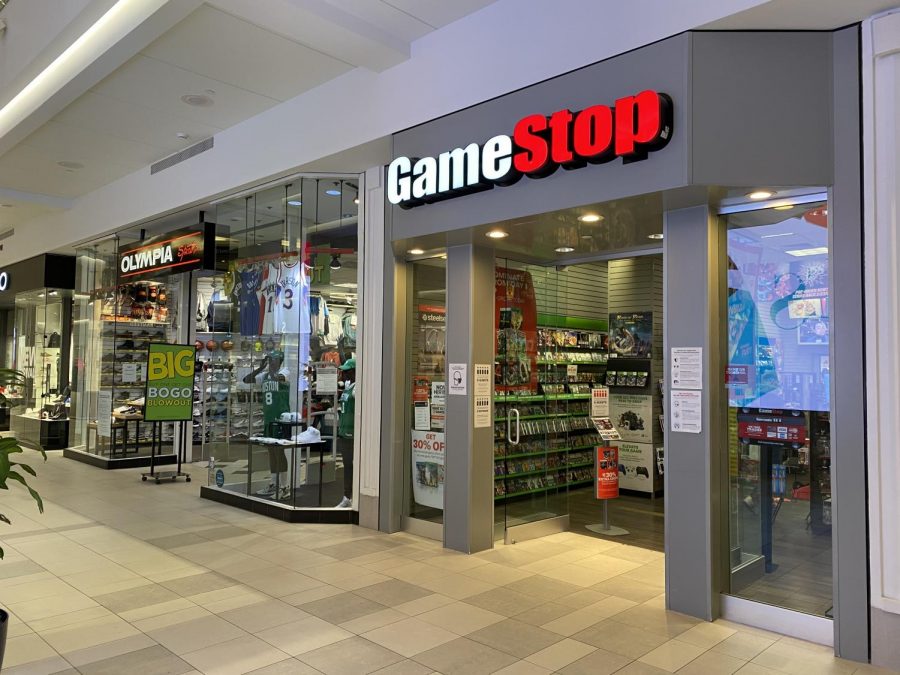GameStop Stocks Skyrocket, Then Plummet, in Historic Week for Wall Street
GameStop’s major surge in stock value was a dig at the institutions of Wall Street.
February 26, 2021
GameStop, an American chain of video game stores, saw the values of its shares rapidly increase in the last week of January 2021, only to plummet a week later. This happened as part of a “short squeeze” and will have lasting implications on the stock market going forward.
Once a highly successful business during the early 2000s, in recent years, GameStop has struggled with the rise of online video game downloads replacing the need to buy a video game at a brick and mortar realtor. Sales have been decreasing for several years, and many anticipated that the COVID-19 pandemic would be the final nail in the coffin for GameStop, when many of its stores were forced to close. In response, many hedge funds shorted the company, borrowing shares only to immediately sell them and buy them back later. A short is essentially a bet against the company; a bet that the share value will fall enough for the short-seller to gain a profit when they eventually buy back their shares. However, short selling is innately riskier than other forms of investment, as unlike in typical investments, where one can only lose as much as they invest, if a stock keeps rising, the losses for the short-seller could theoretically be infinite. For those reasons, shorting is typically performed by hedge funds, pooled investment funds consisting of wealthy individuals and institutional investors, such as Melvin Capital, one of the major short-sellers of GameStop.
CRLS Investment Club President Gabe Herman ’21 noted, “What made GameStop different in this situation is that the shortage was so high that there were more shares of the company being shorted than there were shares.” Some people suspected that the short-sellers were undervaluing GameStop, including members of the internet forum Wall Street Bets (WSB). WSB is a Reddit community with over 8 million members (as of February 10th) known for making risky investments and memes about their gains and losses. WSB consists primarily of individual retail investors as opposed to established Wall Street hedge funds, and this distinction has been characterized as a “David versus Goliath” battle for control over the stock market. Many WSB members view the institutional investors as having an unfair advantage. Believing GameStop was undervalued and hoping to cause losses to the short-sellers, WSB members coordinated to buy shares of GameStop at record rates using the mobile investing app Robinhood. Demand increased and therefore the value of shares in GameStop skyrocketed. The hedge funds who bet against GameStop were facing potentially enormous losses if GameStop’s stock continued rising infinitely, creating a “short squeeze” where their attempts to cover their losses by buying more shares only drove the stock higher.
On January 28th, Robinhood restricted the purchase of several stocks WSB targeted, including GameStop, and consequently was accused of protecting the interests of the institutional investors over the retail investors. Multiple congresspeople—Republican and Democrat—demanded an investigation into Robinhood’s actions, which the US Securities and Exchange Commission (better known as the SEC) has promised. In a letter to Robinhood CEO Vladimir Tenev, Massachusetts Senator Elizabeth Warren wrote, “The public deserves a clear accounting of Robinhood’s relationships with large financial firms and the extent to which those relationships may be undermining its obligations to its customers.” Robinhood emailed their members, writing, “We didn’t want to stop people from buying stocks and we certainly weren’t trying to help hedge funds.” Tenev will reportedly be testifying at a House Financial Services Committee hearing.
After a tumultuous week, GameStop stock appeared to be back on the decline, but there will be lasting implications for the stock market. For one, as Herman put it, this was a “new revolution against Wall Street, against the institutions, which had never happened before to this extent.” These events also demonstrate just how volatile the stock market can be. Furthermore, many Americans—particularly young people—invested for the first time during the GameStop short squeeze. On the one hand, they were exposed to and learned about the stock market, but on the other hand, many inexperienced investors faced losses that demonstrate the dangers of investing as part of a trend without a plan. The inevitable litigation to follow—including dozens of class-action lawsuits against Robinhood—will determine the long-term effects of the GameStop short squeeze. One thing is for certain: WSB is not going away, and neither is the growing divide between the elites of Wall Street and the average American.










